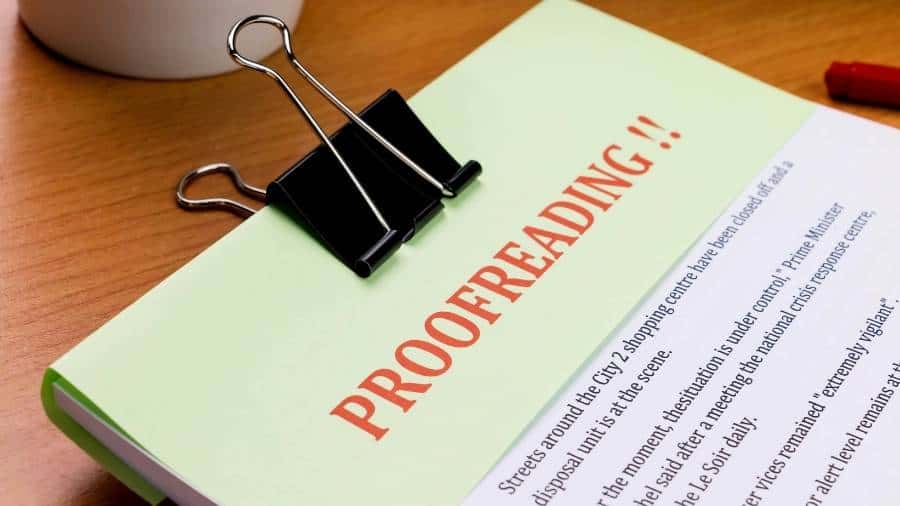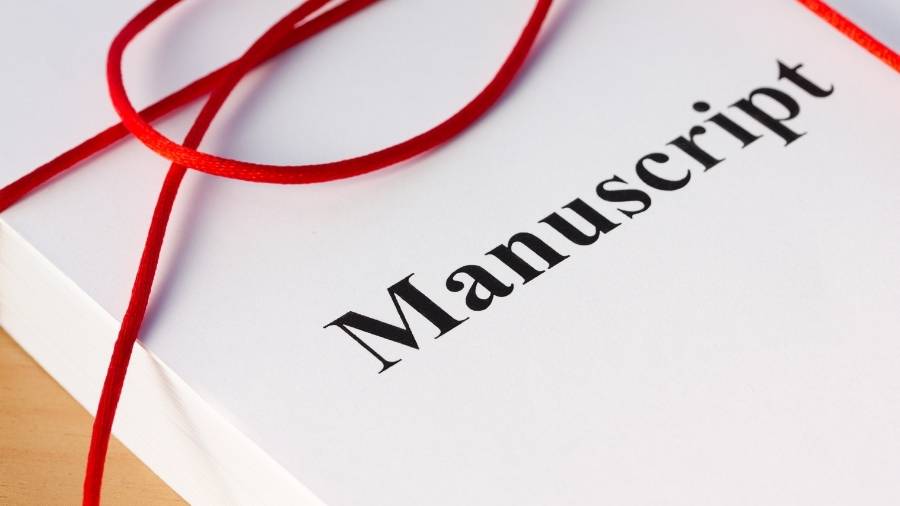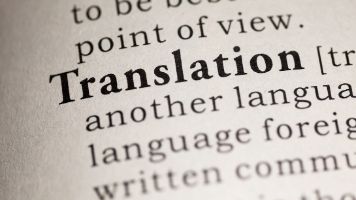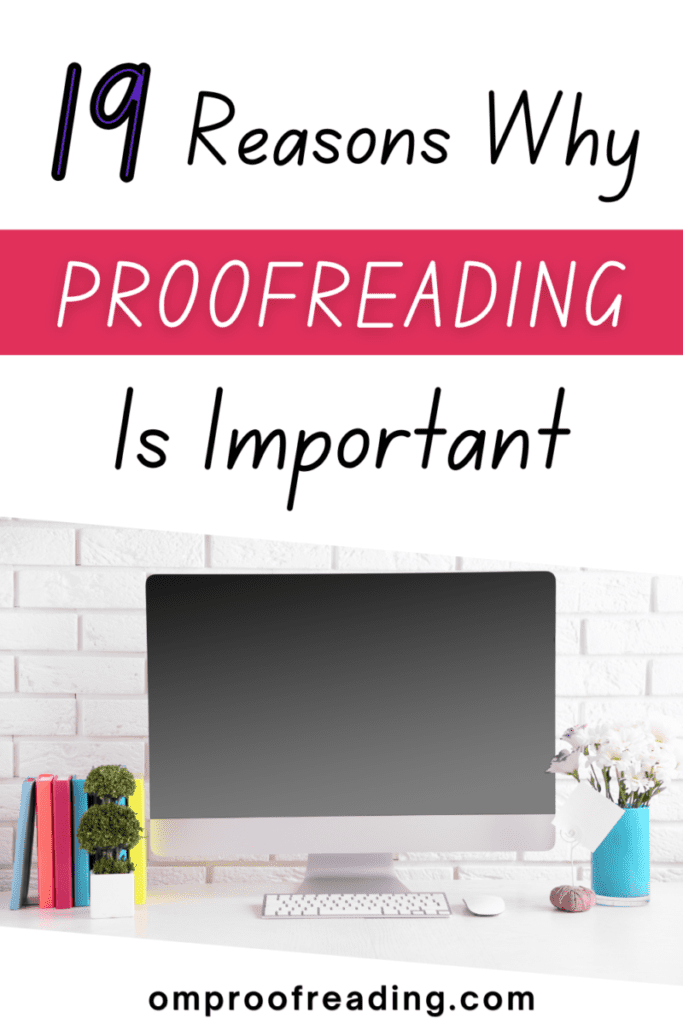This article may contain affiliate links. Please see our affiliate disclaimer in the footer menu for more information. Thank you for your support!

As a professional proofreader, I can tell you why proofreading is important and what can be gained (or lost) based on whether written work is adequately proofread.
Proofreading is important because it is the last chance to find and fix errors before a document is presented to readers. Proofreading eliminates grammar, punctuation, capitalization, spelling, and formatting mistakes, allowing us to communicate our message accurately and effectively.
Let’s look at many reasons why proofreading is a significant step that should never be skipped.
Om Proofreading has a post about what proofreading entails if you’d like to check it out.
Why Proofreading Is Important
1) It lets people focus on our message, not our mistakes.
Overlooked errors are distracting!
Do we want our readers to trip over typos while trying to take in what we’re talking about? Of course not. We want them to have a seamless reading experience so that our message can be understood clearly.
Our writing should aim to inform and even to fascinate, but never to frustrate.
2) It enhances our authority and protects our reputation.
A text riddled with errors can quickly ruin our credibility.
If we didn’t take the time to polish the details in our document, how can we be trusted with the bigger picture?
A well-written text will boost our authority and protect our reputation as someone knowledgeable about their subject matter.
3) Proofreading ensures we say what we mean to say.
We know that punctuation has the power to change the meaning of a sentence. Maybe you’ve seen the popular meme floating around the internet that shows two versions of the same sentence:
- “A woman, without her man, is nothing.”
- “A woman: without her, man is nothing.”
I think we can agree that these two sentences are nothing alike. Do they have the same words written in the same order? Yes. Do they have the same meaning? Not so much.
4) Proofreading can shield us from embarrassment.
Mistakes can range from mildly uncomfortable to downright embarrassing! Do we want the general pubic to witness us making those missteps? Oh, wait. Do you see what just happened there? Whoops! 😉
If you’d like to learn about a few errors that inevitably caused people their fair share of embarrassment, please check out the video below by author John Green.
5) It allows us to make a good impression.
If our writing is polished and refined, people are more likely to view us as polished and refined.
Our written word is often the first way we make an impression on an audience—representing us in our absence. And we know what they say about first impressions. 😊
6) Proofreading shows we care about our work.
We put time and effort into things we care about.
Whether it’s a customized tree house someone has lovingly built for their children or a romantic evening that was thoughtfully planned for a partner, attention to detail shows we care.
When we care about our writing, we won’t hesitate to focus on the little things. And people will notice!

7) It potentially saves us a lot of money.
Most typos don’t cause any monetary misfortune, but now and then, typos cost big bucks!
The article “5 Times Hiring a Proofreader Could Have Saved Millions of Dollars” mentions several errors that were considerably costly for companies—one of which cost a business $225 million in one day!
I wrote an article about the process of hiring a proofreader if you need one.
And you can watch the video below if you’d like to hear about more astronomically expensive mistakes.
8) Proofreading improves our chances of landing a job.
I think it’s fair to say that most hiring managers are allergic to spelling slipups and grammatical gaffes. Eradicating errors from résumés, CVs, and cover letters is crucial if we want a decent shot at securing the position we’ve been vying for.
In CareerBuilder’s article “How to Avoid Red Flags on a Résumé,” they state the following:
“Bad grammar, spelling mistakes, and typos on your résumé can instantly take you out of the running for the job.”
– CareerBuilder
Another older article from CareerBuilder talked about some of the most mystifying mistakes that job candidates made on their résumés. One job seeker went into detail about their arrest history, and another changed the font type each time they started a new sentence.
Note to Self: I know you think all colors of the rainbow are beautiful, but it sounds like you’ll just have to grin and bear it by using a plain-Jane white background for your next résumé. Maybe the three-shades-of-purple résumé you’ve been sending out lately is only rewarding to you.

9) It increases professionals’ chances of being published in scholarly journals.
Elsevier Author Services rejects 30%–50% of the articles submitted to their journals before these articles reach the peer review stage. They note that one of the principal reasons for rejection is poor language.
“Submitting a paper that is not only error-free but also clear and understandable is essential to get published.”
– Elsevier Author Services
Reputable scholarly journals receive far more submissions than they can publish, so editors often look for reasons to narrow down the pool of papers awaiting publication.
Faulty formatting or less-than-stellar grammar, punctuation, or spelling will likely convince the editor that a paper isn’t ready for peer review.
These errors are preventable; proofreading is the antidote.
Proofreading scholarly documents is part of academic proofreading.
I wrote an article about academic proofreading if you’d like to explore this topic.
10) It assists businesspersons in building trust in their brand.
Business owners produce content for internal and external use. Some of the content they put out includes the following:
- website copy
- proposals
- reports
- product descriptions
- user manuals
- letters
- emails
- memos
- brochures
- social media posts
The people behind these businesses hope their written communication will inspire confidence in their employees and clients. Carefully proofread prose helps build customer relationships because it shows the company dedicates sufficient effort to revising its copy.
If they’ve been disciplined with the details in their writing, they’ll likely be equally attentive to their clients.
I wrote an article about the importance of proofreading emails (with helpful tips included) if you’re interested.
11) It can bolster a businessperson’s earning potential.

Would you bother buying a product or service from a company if its website was riddled with formatting faux pas, spelling snafus, or punctuation pitfalls?
That would be like trusting a doctor who doesn’t properly pronounce the names of internal organs. It may seem subtle, but it matters!
Business owners can attract more customers and make more sales if they produce top-notch written work. If their written work is sloppy, people will likely assume their products and services lack quality.
12) Proofreading allows students to get better grades.
Whether it’s a test, quiz, essay, paper, or other written assignment, students who carefully proofread their work get higher grades.
The proper use of grammar and mechanics allows students to formulate clear and cohesive sentences.
This ability to effectively articulate the message they want to get across helps them make the grade!
13) It boosts high school students’ chances of getting into a good university.
Students hope to impress college admissions committees with the thoughtful and inspiring essays they’ve worked so hard to compose. But to captivate the committees, it’s not just the essay’s content that needs to be on point.
Students need to ensure that pesky punctuation problems or grammatical goofs haven’t taken up residence in their otherwise glowing narratives.
Competition for some colleges is fierce, and having an essay that’s as close to perfect as possible could give a student the winning edge.
14) It supports graduate students in producing a high-quality thesis.
Excessive errors in a thesis detract from the student’s argument and even lead others to question how carefully they conducted research. Grad students are among the various groups of people who enlist professional proofreaders to revise their work.
Ideally, the proofreader of a thesis would be knowledgeable about the subject matter. This awareness would allow them to correct any misused terminology and even catch an egregious error that may have slipped through the cracks in previous editing passes.
The proofreader could also identify when the student hadn’t followed the specified style guide.
15) It benefits authors who want to get their manuscripts published.

Authors who take the time to have their manuscript proofread have a better chance of finding a literary agent and getting their book published.
If you look on Amazon, you’ll find that books get bad reviews when readers become disgruntled by too many typos.
A smooth reading experience makes it a pleasure to get lost in a book. Who wants to get yanked out of a riveting story because of problematic punctuation or grammar?
16) It enables lawyers to provide legal texts free of misunderstandings.
Most attorneys spend a ton of time writing. They craft employment contracts, partnership agreements, petitions, cease and desist letters, and more. They have to stay on top of seemingly endless paperwork.
Legal texts must be worded and punctuated carefully to avoid misunderstandings, loopholes, and unintended consequences.
Proofreading ensures these documents retain their intended meaning. Lawyers also need to check over the citations in their texts. Errors with citations can call a lawyer’s professionalism into question.
Finally, lawyers need to pay close attention to details in their written work so their clients feel they can be trusted. If an attorney’s written communication contains careless mistakes, clients will probably assume the lawyer will be equally careless with their case.
17) It helps doctors to ensure patient safety.
Doctors also do copious amounts of writing. Part of their work involves documenting essential elements of patients’ health in electronic health records (e.g., medical history, lab and test results, medications).
Since this information relates to a person’s health, it must be written and revised carefully.
Also, medical transcriptionists are often brought into medical practices to transcribe clinical notes dictated by doctors.
Typing these notes can be challenging due to background noise or if a doctor speaks too quickly, has a thick accent, or tends to mumble. Therefore, physicians must amend any errors in the transcription.
Finally, doctors need to double-check the numbers they’ve written on prescriptions. It’s necessary to ensure that any decimal points are in the right place so that the patient receives the correct dose of medicine.
18) It allows translators to preserve the meaning of the original document.

Translators work hard to retain the meaning of the original text. A misused word or an overlooked grammatical error can alter a document’s meaning, which makes proofreading a necessity for all translations.
A well-translated text with as few mistakes as possible will garner trust from readers.
19) It permits content creators to rank their articles higher on Google.
Google produced a comprehensive Search Engine Optimization (SEO) Starter Guide that gives content creators advice on how to write content Google will approve of. This content takes the form of blog posts and other website copy.
The guide notes that one of the best practices for content writers is to produce text that’s easy to read.
Google explicitly recommends that people “avoid writing sloppy text with many spelling and grammatical mistakes.”
But Google isn’t the only search engine harping on the need for well-written content. Bing has also been vocal about this necessity.
In this article on Bing blogs, Sr. Product Manager at Bing, Duane Forrester, noted, “If you struggle to get past typos, why would an engine show a page of content with errors higher in the rankings when other pages of error-free content exist to serve the searcher? Like it or not, we’re judged by the quality of the results we show. So we are constantly watching the quality of the content we see.”
Proofreading will eliminate these blunders, allowing for a satisfying reading experience and helping to lower a website’s bounce rate.
If readers are too annoyed by typos, they may look for another site to get the information they need.
If you’d like to learn how to polish your writing effectively, I wrote an article about helpful proofreading strategies.
I hope this article has helped you understand the importance of proofreading and how it adds immense value to any written document.
Here’s to moving from one enjoyable reading experience to the next!
Best wishes to you!
“Do not go where the path may lead, go instead where there is no path and leave a trail.”
– Ralph Waldo Emerson

Recent Posts
Punctuation is important because it enables us to communicate our message clearly and effectively. Without punctuation, we wouldn’t understand how units of a sentence relate to one another or how...
Although you're probably somewhat familiar with adverbs, you may be unaware of sentence adverbs. As a trained proofreader who has studied the parts of speech, I can help you understand this unique...
